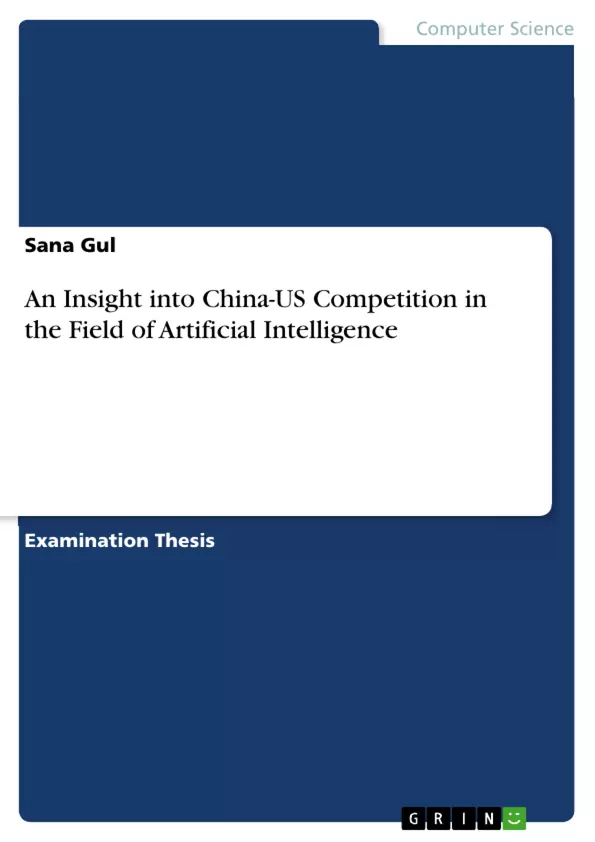Artificial intelligence has recently emerged as a new subject of international competitiveness. In the realm of artificial intelligence, both United states and China are world leaders. The struggle between both the countries in AI will heighten mutual mistrust, accelerate the artificial intelligence arms race, and endanger geopolitical stability. This research looks at how both nations are progressing in many sectors of artificial intelligence and how Beijing is challenging America. However, there remains a gap between them in terms of artificial intelligence advancement. In the race for artificial intelligence supremacy, the United States is losing ground to China because of no long term strategy. The study examines the prospect that artificial intelligence might have an impact on the two nations' national security, as well as substantial alterations in the future power structures of the US and China. Still, China may become an emerging global power, and it is using artificial intelligence to elevate its position by sidelining the United States.
Inhaltsverzeichnis (Table of Contents)
- CHAPTER 1
- INTRODUCTION
- Literature Review
- Problem Statement
- Research Objectives
- Research Questions
- Theoretical Framework
- Significance of the Study
- Methodology
- Tentative Organization of Chapters
- CHAPTER 2
- ARTIFICIAL INTELLIGENCE AND NATIONAL SECURITY
- Background
- National Security and Artificial Intelligence
- Formulating National Security Strategy
- National security-related application of AI
- China's and America's national security and Artificial Intelligence
- CHAPTER 3
- COMPARATIVE ANALYSIS OF CHINA AND AMERICA'S PROGRESS IN AI
- Chinese Progress in Artificial Intelligence
- US progress in Artificial Intelligence
- Competition's Drivers between China and the US
- CHAPTER 4
- FUTURE PROSPECTS OF CHINA-UNITED STATES RELATIONS IN THE AI ERA
- China On the Road to Artificial Intelligence (AI) Supremacy
- Analysis of AI competition between China and the US and its Implications for the US
- What Will Happen if China Overtakes the US in AI?
- The consequences of a Chinese AI takeover
- The new military superpower
- Technological hub
- CHAPTER 5
- CONCLUSION AND RECOMMENDATIONS
- Conclusion
- Recommendation
Zielsetzung und Themenschwerpunkte (Objectives and Key Themes)
This research examines the burgeoning competition between China and the United States in the field of artificial intelligence (AI). The study aims to analyze the progress of both nations in various AI sectors, highlighting China's challenge to America's leadership. It explores the potential impact of AI on national security and the evolving power structures of both nations.
- The emergence of AI as a new arena of international competition
- The rivalry between China and the United States in the AI domain
- The implications of AI development for national security
- The potential shift in global power dynamics driven by AI advancements
- The strategic considerations and implications of a potential Chinese AI supremacy
Zusammenfassung der Kapitel (Chapter Summaries)
- Chapter 1: Introduction: This chapter sets the stage for the research by outlining the problem statement, research objectives, research questions, and theoretical framework. It also discusses the significance of the study, the methodology employed, and the tentative organization of the chapters.
- Chapter 2: Artificial Intelligence and National Security: This chapter explores the intersection of artificial intelligence and national security. It examines the background of AI, its applications in national security strategies, and how China and the United States are using AI for their respective national security interests.
- Chapter 3: Comparative Analysis of China and America's Progress in AI: This chapter provides a comparative analysis of China and the United States' progress in artificial intelligence. It analyzes their advancements in different sectors of AI and explores the factors driving the competition between them.
- Chapter 4: Future Prospects of China-United States Relations in the AI Era: This chapter examines the future prospects of China-US relations in the AI era. It explores the potential consequences of China overtaking the US in AI, including the emergence of a new military superpower and a technological hub.
Schlüsselwörter (Keywords)
The main keywords and focus topics of this research include: artificial intelligence, national security, China, United States, international competition, AI development, AI supremacy, global power dynamics, strategic considerations, technological advancement, and geopolitical stability.
Frequently Asked Questions
What is the focus of the China-US competition in AI?
The competition focuses on achieving supremacy in artificial intelligence, which is seen as a key driver for future military power, economic dominance, and technological leadership.
How does AI impact national security for the US and China?
AI impacts national security through its applications in defense strategies, intelligence gathering, and the development of next-generation military hardware and software.
Is China overtaking the United States in AI?
The research suggests that the US is losing ground because it lacks a long-term strategy, while China is rapidly advancing and challenging American leadership in various AI sectors.
What are the consequences of a potential Chinese AI takeover?
Consequences could include a shift in geopolitical stability, the emergence of a new military superpower, and China becoming the primary global technological hub, sidelining the US.
What role does AI play in global power dynamics?
AI is considered a "new subject of international competitiveness" that will likely alter future power structures and heighten mutual mistrust between leading nations.
- Quote paper
- Sana Gul (Author), 2021, An Insight into China-US Competition in the Field of Artificial Intelligence, Munich, GRIN Verlag, https://www.grin.com/document/1164076



